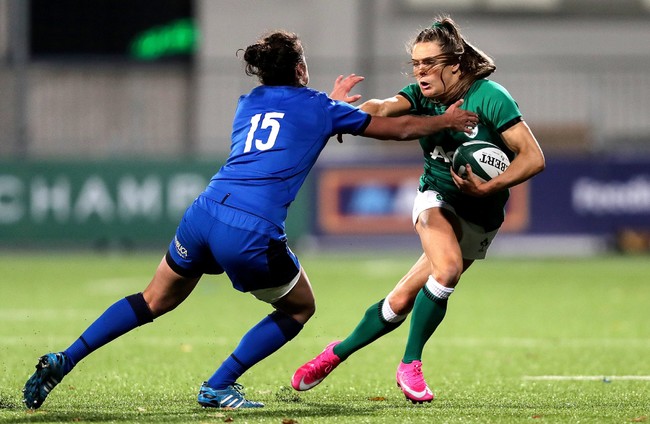THE CONDENSED FORMAT isn’t perfect, particularly now that the postponement of the World Cup until next year means organisers could have actually got a full Six Nations away, but the return of international women’s rugby this weekend is very welcome.
Ireland don’t get underway until 10 April when they face Wales away in a tough first assignment for their resumption of Test rugby, with the visit of France to Dublin to follow on 17 April before a play-off fixture decides their finishing position for 2021.
This championship feels like the beginning of what could be a momentous but challenging few years for the women’s game.
The Women’s Six Nations is in a standalone window for the first time and it will be intriguing to see whether this impacts interest levels among the public, as well as attention from the media. Tournament organisers believe the change – enforced by the pandemic in the end – could become permanent.
The postponement of this year’s World Cup in New Zealand until 2022 was a major disappointment for everyone due to be involved, but it’s difficult not to be excited about the prospect of the tournament taking place in a post-Covid world where fans and families can travel to attend the biggest competition in the game.
On reflection, had the World Cup been pushed through this year, most of the teams would be been extremely under-prepared and it would have affected the spectacle and quality of play. Next year, perfectly primed athletes will get the chance to show the world what women’s rugby is about.
Then in 2023, the new WXV global competition will launch, providing the women’s game with much-needed clarity around its autumn schedule. The three-tier, 16-team plan is not without flaws but it’s a very welcome move from World Rugby, who have pledged to financially support it and who think it can be a commercial success too.
“The new calendar will be great when it comes into effect,” said Ireland captain Ciara Griffin this week. “We all want to play more matches.”
WXV will be a fascinating challenge for Ireland, among others, and will surely raise the debate around semi-professionalism or full professionalism in the women’s game on this island to another level.
Whatever about amateur players dedicating themselves to being available and ideally-prepared for a Six Nations every year, adding in a full autumn schedule and any summer tours [they are part of the plan for women's rugby too] would make those demands even more unsustainable.
IRFU performance director David Nucifora recently played down talk of professionalism in women’s rugby as “a distraction” as he stressed his belief that “the immediate focus needs to be on increasing the size of the player pool by creating pathways for young girls and women that gives them easy access to the game.”
Nucifora said “professionalism may become a reality at some stage in the future and that is an admirable aspiration” but his resounding point was that he and the union won’t be going in that direction any time soon.
Whether they can keep asking amateur players to pitch up for Six Nations, summer Tests, and the WXV in autumn is very questionable.
Private equity firm CVC are now 1/7th partners of the Six Nations, of course, and their belief is that women’s rugby is under-commercialised and ready for a revolution. If they’re right, players simply must benefit financially as much as anyone else.
There has also been recent talk about a women’s Lions tour, with a feasibility study backed by an insurance company Royal London currently assessing the prospect.
Again, there are flaws in the idea – England being the only professional women’s team would surely see them utterly dominate the selection, for starters – but there is plenty of excitement within the game about the possibility.
“Any player would put their hand up if that Lions tour would go ahead,” said Griffin.
While all of this big-picture talk is going on, the grassroots remains as important as anything else in the women’s game. We might not all agree with Nucifora’s viewpoint on professionalism but he’s right about the need to grow playing numbers and improve the pipeline even further.
The hope is that the gradual re-opening of Ireland this year will allow the good work that has been going on with girls’ and women’s teams around the country to spring back into life again with renewed energy and ambition.
Clearly, the top end of the game is moving in an exciting direction but Irish rugby, and everyone else, need to ensure that the promising youngsters of today will be ready to take advantage in the future.
2021 Six Nations fixtures:
[All games will be shown live on RTÉ or the RTÉ Player]
Saturday 3 April:
Pool A – England v Scotland. 3pm, Castle Park, Doncaster [RTÉ Player]
Pool B – France v Wales. 8pm, Stade de la Rabine, Vannes [RTÉ Player]
Saturday 10 April:
Pool A – Italy v England. 2pm, Stadio Plebisito, Padova [RTÉ Player]
Pool B – Wales v Ireland. 5pm, Cardiff Arms Park, Cardiff [RTÉ 2]
Saturday 17 April:
Pool A – Scotland v Italy. 5pm, Scotstoun Stadium, Glasgow [RTÉ Player]
Pool B – Ireland v France. 2.15pm, Energia Park, Dublin [RTÉ 2]
Saturday 24 April:
Italy v Pool B team ranked in the same position. 12pm
England v Pool B team ranked in the same position. 2pm
Scotland v Pool B team ranked in the same position. 5pm.



